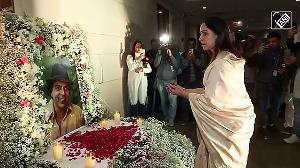In case of a premature US exit from Afghanistan, Indian policy makers will be confronted with tough policy choices, writes Dr Shanthie Mariet D'Souza
In less than a year of his presidency, President Barack Obama has announced yet another strategy on Afghanistan with a 'renewed' commitment to resource the 'just war' and a less ambiguous 'exit strategy'.
After three months of deliberations following the controversial fraud-marred Afghan presidential elections, Obama announced the new US counter-insurgency strategy in Afghanistan. He has agreed to send 30,000 US troops in response to his top military commander General Stanley McChrystal's request for 40,000. In addition to these troops, Defence Secretary Robert Gates has been authorised to send an extra 3,000 troops. Along with support personnel, the final number could be as high as 35,000 additional US troops for Afghanistan. Obama also requested NATO allies to contribute another 10,000. So far, NATO appears to have managed to garner support for only 7,000 troops.
General McChrystal would thus eventually get his magic number of 40,000 additional troops, with which he has promised to 'reverse' the tide of the Taliban momentum in 12 months through a counter-insurgency strategy of 'clear, hold, build and transfer'.
While an increase in troop numbers for a 'population centric' policy is an essential step forward, without clear rules of engagement in dealing with the tribes, especially the Pushtuns in south and east Afghanistan, it could result in further alienation of the people.
Before the troops seek to target Taliban strongholds in Helmand in the south and the Haqqani network bases in the east, especially in Paktia, Paktika and Khost, building 'trust' among the local population remains a critical yet neglected component of the counter-insurgency campaign. Though security remains primary for Afghans, they also look for a long-term commitment from the international forces, with development and progress also taking place in tandem.
The present strategy has rightly emphasised on the civic component. But the need is not essentially the dispatch of more American experts but the build up Afghan capacities in better governance and aid delivery mechanisms. Moreover, internal divisions between the US ambassador and the US military commander, lack of 'unity of effort' in the military strategies and aid distribution coupled with the presence of an array of international actors working in an uncoordinated manner, will all further contribute to dissipated efforts. The net impact would be lack of trust among Afghans about the efficacy of these international efforts. The lead role that the United States wants to assign the Afghans in rebuilding Afghanistan would never come about.
A major problem in outlining a time table for withdrawal is the need for a phased transition to an Afghan-led security force. Building up the Afghan national security forces, which include the Afghan National Army and the Afghan National Police, and their capacities to take over from the US forces in 18 months is imperative. If the objective is to increase the ANA's strength to 250,000 and that of the ANP to 150,000, as currently proposed by the Afghan government, there would still be problems related to mentoring and funding.
The most widely debated aspect of Obama's December 1 declaration is the setting of a time frame for drawdown of US forces. Although it ends a lot of speculation about American aims and intentions in that country, and promises some clarity to domestic constituencies where support for the Afghan war is waning, setting an arbitrary date for withdrawal is both worrisome and problematic in the region. This has already evoked regional scepticism particularly among the Afghans and the Pakistanis.
In Pakistan, there are serious concerns about the United States leaving them out in the cold yet again. Such insecurities would result in Pakistan remaining a reluctant partner in the counter-insurgency efforts instead of becoming a 'strategic ally' as the United States wants it to become. Thus, the Afghan Taliban leadership based in the Pakistani cities of Quetta and Karachi would remain virtually unscathed and there would be no blunting of the insurgent's future capabilities.
History is rife with examples of sanctuaries, safe havens and porous borders playing a debilitating role in counter-insurgency campaigns. While partnership with Pakistan has been highlighted, tying aid to tangible action on the ground would go a long way in breaking the linkages of these groups with their sponsors.
India, which has made considerable investments to support the nascent democratic government and build institutions, has tremendous interest in stabilising Afghanistan. In case of a premature US exit, Indian policy makers will be confronted with tough policy choices.
To help Afghans assume a greater role in the transition stage, India can play an important role in mentoring and augmenting the capacities of the Afghan security forces. It could work more with the Afghan government in building a politically inclusive order, local institutions of governance and the justice sector. India cannot ignore the fact that instability could spread across the region as the Americans prepare to leave in 18 months.
It cannot sit back and watch Afghanistan slip into an abyss, which will be detrimental to India's national security interests.
Obama's December 1 message to the Afghan people was as confusing as allegations of fraudulent presidential elections. He told Afghans that their security is paramount and that the United States is not an occupying force. But he added that the US goal of destroying Al Qaeda takes precedence over everything else. This conflicting message, along with signals that the United States seeks to exit in 18 months, will be viewed with scepticism by fence sitters in Afghanistan who will identify the victor as the one who endures.
Dr Shanthie Mariet D'Souza is Associate Fellow, Institute for Defence Studies & Analyses, New Delhi





